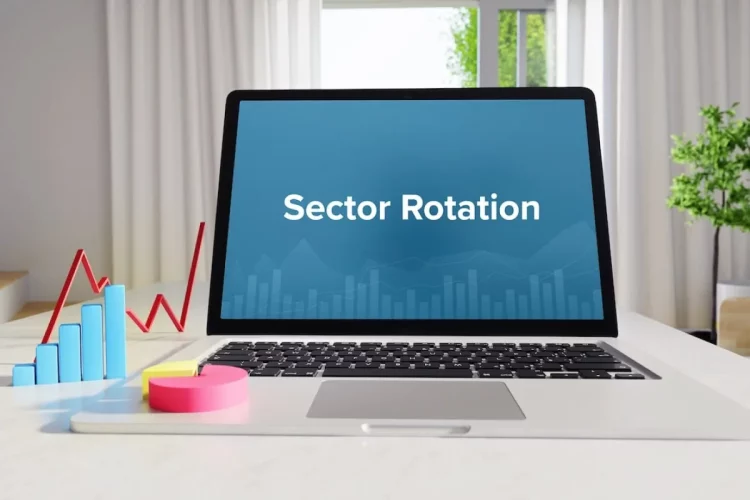Introduction: Understanding Sector Rotation
Sector rotation is a dynamic investment strategy where investors shift their focus from one sector of the economy to another based on the changing phases of the business cycle. The idea is to capitalize on the performance of different sectors at various stages of economic growth, expansion, contraction, and recovery. By strategically rotating between sectors, investors aim to optimize returns and reduce risk by aligning their portfolio with the economic environment.
In this article, we will explore the concept of sector rotation, its benefits, and expert insights on how investors can time their sector shifts for maximum profitability. We’ll also discuss the key factors to consider when selecting sectors and how sector rotation can be used as a tool for building a resilient and dynamic investment portfolio.
What is Sector Rotation?
Sector rotation is a strategy that involves shifting investments from one sector to another in response to changing economic conditions. Sectors perform differently depending on where the economy stands in the business cycle. By identifying these trends and reallocating investments accordingly, investors can position themselves to take advantage of sectors that are expected to outperform during a given period.
The business cycle is typically divided into four stages:
- Expansion: During periods of economic growth, sectors that are sensitive to consumer spending and investment, such as consumer discretionary and technology, tend to perform well.
- Peak: As the economy reaches its peak, inflation may rise, leading to higher interest rates. Defensive sectors, such as utilities and healthcare, may outperform due to their stability and steady demand.
- Contraction: During a downturn or recession, cyclical sectors like energy, materials, and financials tend to struggle. However, defensive sectors such as consumer staples and healthcare can hold up better.
- Recovery: As the economy begins to recover, sectors such as industrials, financials, and technology typically benefit from increased demand and economic activity.
By understanding these cyclical patterns, investors can rotate their investments to align with the sectors that are poised to perform well at each stage.
The Benefits of Sector Rotation
Sector rotation offers several advantages that can enhance a portfolio’s performance and mitigate risks:
- Capitalizing on Economic Cycles: By strategically rotating between sectors, investors can take advantage of the sectors that are likely to outperform during different phases of the business cycle. This allows them to maximize returns and minimize losses.
- Diversification: Sector rotation can help diversify a portfolio by spreading investments across multiple industries, reducing the impact of a downturn in any single sector. Diversification also helps to manage risk, as different sectors react differently to economic conditions.
- Risk Management: Investing in cyclical sectors during periods of expansion and rotating into defensive sectors during recessions can help protect a portfolio from significant losses. This strategy allows investors to adjust their exposure to risk based on prevailing economic conditions.
- Tactical Advantage: Sector rotation is a proactive investment strategy that allows investors to be more tactical in their approach. It enables them to move away from sectors that are underperforming and into sectors that are experiencing growth, giving them a competitive edge in the market.
- Enhancing Portfolio Performance: By staying aligned with the economic cycle, sector rotation can boost a portfolio’s returns over time. Rather than holding onto investments in sectors that may not be performing well, investors can continually adapt and invest in sectors with the most potential.
Timing Sector Rotation: When to Make the Switch
Timing is a crucial aspect of successful sector rotation. While it is difficult to pinpoint the exact moment when a sector will outperform or underperform, there are several indicators that can help investors make informed decisions about when to rotate their investments.
- Economic Data and Indicators: Key economic indicators such as GDP growth, unemployment rates, inflation data, and consumer confidence can provide valuable insights into the current phase of the business cycle. For example, a strong GDP growth rate and low unemployment might signal an expansion phase, where growth-oriented sectors like technology and consumer discretionary are likely to outperform.
- Interest Rates and Inflation: Central banks, particularly the Federal Reserve in the United States, play a significant role in determining the direction of interest rates. When the Fed raises rates to combat inflation, cyclical sectors like energy, materials, and industrials may struggle. Conversely, during periods of lower interest rates, these sectors may benefit from increased demand and borrowing. Inflation trends are also key indicators of potential sector performance, with certain sectors such as consumer staples and utilities performing better in high-inflation environments.
- Corporate Earnings Reports: Corporate earnings reports can give investors insight into how specific sectors are performing. Strong earnings growth in sectors like technology or healthcare may indicate that these sectors are well-positioned for growth in the coming quarters. Conversely, weak earnings reports from sectors like energy or financials could signal that a rotation away from these sectors is necessary.
- Market Sentiment and Investor Behavior: Investor sentiment and market trends can also signal when a sector rotation may be appropriate. For example, when investor sentiment shifts toward a particular sector due to new technological developments or government policies, it may be an indicator to allocate more capital to that sector. Similarly, if a sector experiences negative sentiment due to regulatory changes or geopolitical issues, it may be time to reduce exposure.
- Leading Economic Indicators (LEIs): LEIs, such as the Conference Board’s Leading Economic Index, provide a forward-looking view of economic conditions. When LEIs show signs of growth, sectors such as industrials and materials may benefit from the ensuing expansion. If LEIs start to weaken, defensive sectors like healthcare or utilities may become more attractive.

Sector Selection: Expert Recommendations for Optimal Returns
Successfully rotating sectors requires not only timing but also selecting the right sectors to invest in. Expert investors and analysts recommend focusing on sectors that are expected to outperform during specific phases of the business cycle. Here are some key sectors to consider for each stage of the cycle:
- Expansion Phase:
- Technology: Technology stocks tend to perform well during periods of economic growth. Increased consumer spending and business investment in new technologies fuel growth in this sector.
- Consumer Discretionary: Sectors such as retail, automotive, and leisure see increased demand during economic expansions as consumers have more disposable income to spend.
- Industrials: As the economy expands, demand for industrial products and services rises. Companies in manufacturing, transportation, and infrastructure can benefit from increased economic activity.
- Peak Phase:
- Healthcare: As inflation rises and interest rates increase, investors often flock to defensive sectors like healthcare, which tends to be less sensitive to economic cycles.
- Utilities: Utilities offer stable dividends and steady demand, making them an attractive option during the peak phase when investors seek more stability in their portfolios.
- Consumer Staples: Companies in the consumer staples sector, such as food and beverage, household products, and personal care, are less impacted by economic fluctuations and tend to perform well during peak periods.
- Contraction Phase:
- Defensive Sectors: During periods of economic contraction, defensive sectors like healthcare, consumer staples, and utilities tend to perform better. These sectors provide essential products and services that people continue to need, even in tough economic times.
- Gold and Precious Metals: During recessions, investors often turn to gold and other precious metals as safe-haven assets. This can be a good time to rotate into commodities that tend to perform well during economic downturns.
- Recovery Phase:
- Financials: Financial institutions, such as banks and insurance companies, tend to benefit from a recovering economy as interest rates rise, leading to increased profitability from lending activities.
- Energy: As the economy recovers and demand for energy increases, energy companies are poised for growth. Investing in energy stocks, including oil and gas, can be a profitable strategy during the recovery phase.
- Real Estate: A recovering economy often leads to increased demand for commercial and residential real estate. Real estate investment trusts (REITs) can benefit from this upward trend.
Expert Tips for Implementing Sector Rotation
- Stay Informed and Be Proactive: Successful sector rotation requires staying informed about economic data, market trends, and global events. Regularly review reports from economic institutions, financial analysts, and market experts to help you make well-informed decisions.
- Maintain a Flexible Portfolio: Sector rotation requires a flexible approach to portfolio management. Be prepared to adjust your investments as the business cycle evolves. It’s essential to be agile in responding to changing economic conditions.
- Avoid Over-Rotation: While it’s important to be proactive, avoid excessively frequent rotations based on short-term market movements. Over-rotation can lead to unnecessary transaction costs and missed long-term growth opportunities.
- Consider ETFs and Sector Funds: Exchange-traded funds (ETFs) and sector-focused mutual funds are excellent tools for implementing sector rotation strategies. They provide exposure to a diversified group of companies within a particular sector, reducing the need for individual stock picking.
- Diversify Within Sectors: Even within a chosen sector, diversify your investments to spread risk. For example, in the technology sector, consider investing in a mix of companies across different sub-sectors such as semiconductors, cloud computing, and artificial intelligence.
Conclusion: Building a Dynamic Portfolio with Sector Rotation
Sector rotation is a valuable strategy for investors looking to align their portfolios with the phases of the economic cycle. By understanding the dynamics of sector performance and timing rotations based on economic data and market trends, investors can maximize returns and reduce risk. With expert recommendations on sector selection, investors can build a resilient and dynamic portfolio capable of weathering market fluctuations and capitalizing on growth opportunities.












































